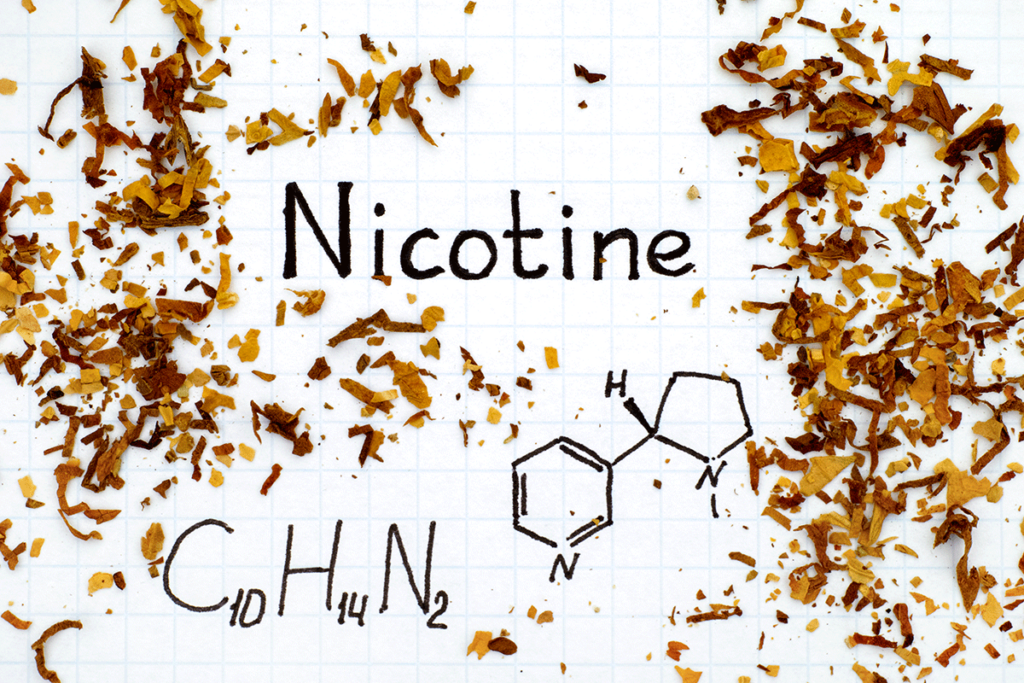If you have wondered, “Is nicotine a depressant?” the answer is yes. Nicotine, which is found in cigarettes and other tobacco products, is classified as a depressant drug. The effects of nicotine on the body can be damaging and addictive, leading to long-term health issues, including addiction and other mental health problems.
At Evoke Waltham, we provide a dual diagnosis treatment program that addresses both addiction and any underlying mental health issues. Our compassionate and evidence-based approach helps patients understand the effects of nicotine on their mental health and develop strategies to manage cravings and overcome addiction.
Don’t hesitate to contact us today at 866.276.1920 and begin your recovery. Remember, you don’t have to face this alone—we are here to support and guide you every step of the way.
What Is Nicotine?
Nicotine is the main “psychoactive” ingredient in most tobacco products. Its role is to rapidly communicate how to respond emotionally to the brain and body. Nicotine is the ingredient that makes tobacco products addictive, including e-cigarettes and vapes.
When tobacco is burned, mostly by cigarettes, it produces nicotine, tar, carbon monoxide, and other harmful chemicals. Many tobacco products contain nicotine, such as cigarettes, cigars, chewing tobacco, snuff, and dried tobacco leaves.
E-cigarettes don’t contain tobacco, but the producers do add nicotine, so the person eventually develops a dependency, but it seems less harmful and more attractive with the yummy flavors. This is how it is marketed to younger audiences.
The most common method of ingesting nicotine is smoking cigarettes, followed by pipe smoking and chewing tobacco. When you smoke, the nicotine is absorbed rapidly into the blood and can affect the brain in less than a minute.
Does Nicotine Work as a Depressant?
Nicotine from chewing tobacco or any other product with nicotine can be both a stimulant and a depressant. Using tobacco products with nicotine causes epinephrine and dopamine hormones that affect the central nervous system. The nicotine chemical is responsible for the “jolt” users get when smoking. In addition, Epinephrine causes increased relaxation and pleasure.
Nicotine also stimulates the release of the pain-inhibiting hormone known as beta-endorphin. Seeking this chemical “high” or the corresponding “numbness” can lead to addiction. Unfortunately, the “high” from nicotine is short-lived, and users start to crash, which leads to the cycle of addiction for that relived “high” feeling.
Why Is Nicotine Considered Both a Stimulant and a Depressant?
Nicotine is unique in how it acts as both a stimulant and a depressant. In most drugs, this is unheard of. Nicotine can be one or both, depending on the person and their reactions to the drug. It can produce short-term energy, like the euphoric effect, but can worsen depression and anxiety long-term in many people.
This drug is very dangerous because you can never know what to expect, and most of the time, the effects don’t seem extreme. And because it is normalized and legal, it is hard to quit. Of course, just like every chronic drug use, there come physical and mental health problems.
Short-term effects of nicotine:
- Restricted airways
- Increased phlegm production
- Increased presence of viruses and bacteria
- Increased risk of asthma
Long-term effects of nicotine:
- Loss of neuro-receptors
- The significant cancer risk increase
- Increase in heart-related illness and can lead to a heart attack
If you are still asking yourself, “Is nicotine a depressant?” The answer is yes, but not in the way that most people think of depressants. Nicotine can act as both a stimulant and a depressant, making it a unique and dangerous drug to use. If you or someone you know is struggling with addiction to nicotine or any other substance, please reach out for help at 866.276.1920. Recovery is possible with effective treatment and support.
Why Is It Important to Understand the Effects of Nicotine?
Understanding the effects of nicotine is paramount for several reasons:
- Awareness of health risks – Recognizing the adverse effects of nicotine on physical and mental health is the first step toward leading a healthier life. Studies have demonstrated that nicotine use can lead to serious health complications, including cardiovascular diseases, lung disorders, and mental health issues such as anxiety and depression.
- Prevention of addiction – Knowledge about the addictive nature of nicotine can deter potential users, especially among the younger generation, from initiating the use of tobacco products.
- Support for those trying to quit – Understanding the challenges faced by individuals trying to quit nicotine can foster empathy and encourage the provision of necessary support.
- Inform policy and regulation – A comprehensive understanding of nicotine’s effects is instrumental in shaping effective public health policies and regulations related to tobacco control.
- Promotion of research and development – A clear understanding of how nicotine affects the human body can also spur further research and development of more effective therapies and interventions for those struggling with nicotine addiction.
Understanding the effects of nicotine goes beyond personal health and well-being. It also has implications for society as a whole, making it crucial to continue exploring and educating ourselves about this substance. If you or someone you know is struggling with nicotine addiction, seek professional help and support to overcome this dangerous substance’s hold. Recovery is possible, and resources are available to help you begin living a healthier life.
Call Evoke Waltham for Addiction Help and Support
Nicotine might seem harmless. It’s legal. Yet, it causes early death in many unfortunate enough to try it. Evoke Waltham knows how difficult it is to stop smoking or quit nicotine products. People who find quitting impossible shouldn’t know they aren’t alone.
We believe that nicotine addicts can forge a new life even under circumstances that seem impossible. Evoke Waltham offers lasting addiction treatment in Waltham, Massachusetts. A team of trained professionals crafts a personalized plan for each individual. Contact us today at 866.276.1920 to get you started on becoming substance-free.


